The Azores – Açores in Portuguese – is an archipelago located in the Atlantic Ocean about 870 miles (1,400 kilometers) west of mainland Portugal.
The group of islands is often hit by powerful North Atlantic swells generated near Newfoundland.
From a surfing perspective, the Azores reminds us of Hawaii. Its nine volcanic islands feature pristine beach breaks, world-class reef breaks, and dreamy, long point breaks.
The Portuguese archipelago delivers consistent waves all year round, but it is now regarded as a premium surfing destination, especially during winter, spring, and autumn.
If you’re visiting the region during summertime, you won’t be welcomed by flat spells. There’s always a small, rideable wave breaking somewhere near the coastline.
The nine Azorean Islands are Santa Maria, São Miguel, Terceira, Graciosa, São Jorge, Pico, Faial, Flores, and Corvo.
The natural beauty of the Azores will forever leave a fingerprint in your memory. Plus, these Atlantic hidden gems might serve up all four seasons in a single day.
Alongside the archipelagos of Madeira, Cape Verde, and the Canary Islands, they form Macaronesia, a Greek word for “islands of the fortunate.”
When you’re not out in the water catching incredible waves, you’ll find plenty of exciting and fulfilling non-surfing activities.
You can go hiking, experience bird-watching, and whale-watching, try canoeing and kayaking, play golf, ride a bike, fish, go paragliding, try scuba diving, or experience geotourism.
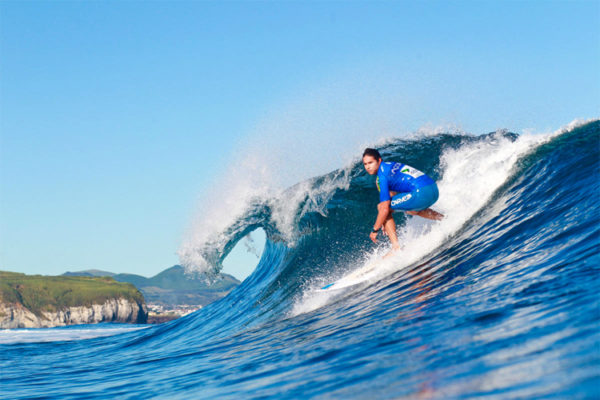
How to Get to the Azores
Despite being a relatively remote archipelago, it is easy and fast to get to the Azores Islands.
There are direct flights from Porto, Lisbon, Amsterdam, Brussels, Frankfurt, Canary Islands, London, Manchester, Munich, New York, Boston, Montreal, and Toronto.
The airline companies flying to the Azores are TAP Air Portugal, SATA, Ryanair, Delta Airlines, TUI fly Netherlands, and TUI TUI fly Belgium.
What time is it in the Azores? The Azores are in the Greenwich Mean Time -1 (GMT-1).
Like most European countries, the region observes Daylight Saving Time (DST), which means six months of lighter and longer evenings.
VisitAzores.com, the official tourism board of the Portuguese island chain, features a complete list of hotels, local lodging, rural tourism facilities, youth hostels, and camping parks, for a pleasant and comfortable stay.
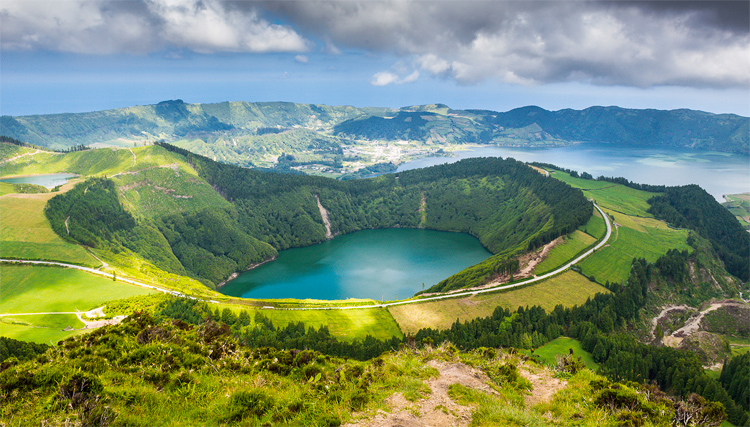
The Azorean Surf Spots
Although the popularity of the Azores as a surf destination is rising steadily, you’ll easily find uncrowded peaks with flawless waves breaking out-the-back.
Its 360-degree swell exposure creates multiple swell and wind combinations and multiplies the chances of enjoying a surf session all by yourself.
The water temperatures range from 62 to 72°F (17 to 22°C), so you’ll need a 3/2mm wetsuit to make sure you’re comfortable in this Atlantic surfing heaven.
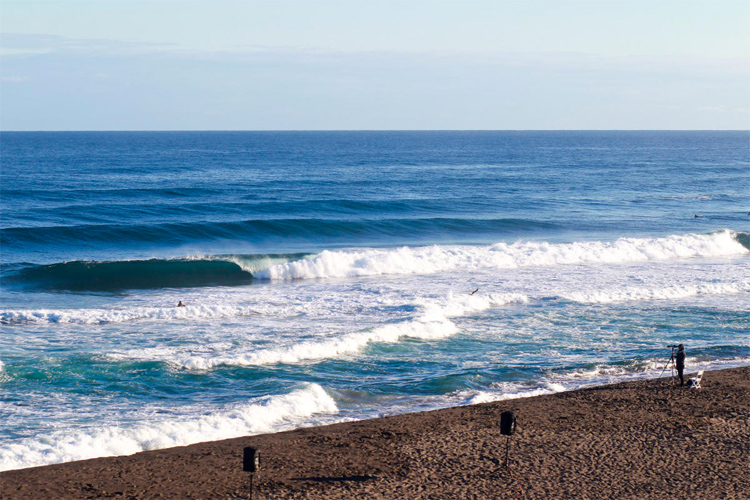
1. São Miguel Island
Mosteiros
The Mosteiros Beach is a right-hand spot with two take-off zones. In one of them, there is a vertical drop over the rocky seafloor, followed by a fast section. This spot is quite popular among local surfers. You may enter and exit the surf break through the beach.
Wave Type: Point Break
Wave Direction: Right
Consistency: ***
Quality: ***
Seafloor: Rocks
Best Swell Direction: W
Best Wind Direction: E-NE
Best Tide: Low
Best Size: 1-2 meters
Experience: Beginner, Intermediate, Advanced
Access: Car
Coordinates: 37.888467, -25.823994
Mosteiros (Port)
Mosteiros is a long and powerful right-hand wave with a large mass of water. It features two distinct take-off points depending on the size of the wave.
With medium-sized surf, the drop is made next to a rock that appears isolated in the take-off area and is quite soft.
With larger waves, the take-off area is located more towards the outside. Good positioning and easy paddling boards are critical for safe access to the peak.
After the drop, the wave becomes flatter, allowing long cutbacks. Entries and exits are made through the fishing port located inside the bay, and paddling to the peak can take between 10-15 minutes.
Wave Type: Point Break
Wave Direction: Right
Consistency: **
Quality: ***
Seafloor: Rocks
Best Swell Direction: O-NE
Best Wind Direction: E-NE
Best Tide: Half
Best Size: 1-2 meters
Experience: Intermediate, Advanced
Access: Car
Coordinates: 37.893123, -25.823047
Calhetas
There are two peaks here. The outside one breaks with four-meter plus swells and requires lots of experience. The inside one, at the pink house, is a right and left barreling wave that, depending on the direction of the swell, has several variations.
With NE swells, it is time for rights; with NW swells, it is a left haven. Enters and exit through a small cove on the west corner of the bay and pay attention to the strong currents, especially on big wave surfing days.
Wave Type: Point Break
Wave Direction: Left
Consistency: **
Quality: ****
Seafloor: Pebbles
Best Swell Direction: N-NE
Best Wind Direction: S
Best Tide: Low
Best Size: 2-3 meters
Experience: Advanced, Professional
Access: Car
Coordinates: 37.820556, -25.599167
Rabo de Peixe
A powerful and tubular left-hand wave accessed by a 10-minute paddling from the fishing port. With waves over three m, it is frequent to find sets closing out at the bay. If you get caught inside, you might be pushed onto the rocks.
Wave Type: Point Break
Wave Direction: Left
Consistency: ***
Quality: ****
Seafloor: Pebbles
Best Swell Direction: N-NE
Best Wind Direction: SW-S-SE
Best Tide: Low
Best Size: 2-3 meters
Experience: Intermediate, Advanced
Access: Car
Coordinates: 37.814722, -25.587500
Areais de Santa Bárbara
This beach has hosted a World Surf League (WSL) Qualifying Series Prime event since 2010 and is one of the most visited surf spots in São Miguel. It is nearly one kilometer long and features several peaks, all of which are right and left-hand barreling A-frames.
The spot showcases three distinct surf areas: Tuká Tu Lá (east), the Meio da Praia (middle), and Cantinho (west).
Despite being a quite crowded beach, especially during the summer, there is room for everyone, and every surfer can always find an empty peak. With NW and NE winds, it has become increasingly sought after by kitesurfers.
Wave Type: Beach Break
Wave Direction: Left, Right
Consistency: *****
Quality: *****
Seafloor: Sand
Best Swell Direction: NW-N-NE
Best Wind Direction: S-SE
Best Tide: Half
Best Size: 0.5-2.5 meters
Experience: Beginner, Intermediate, Advanced
Access: Car
Coordinates: 37.818889, -25.542500
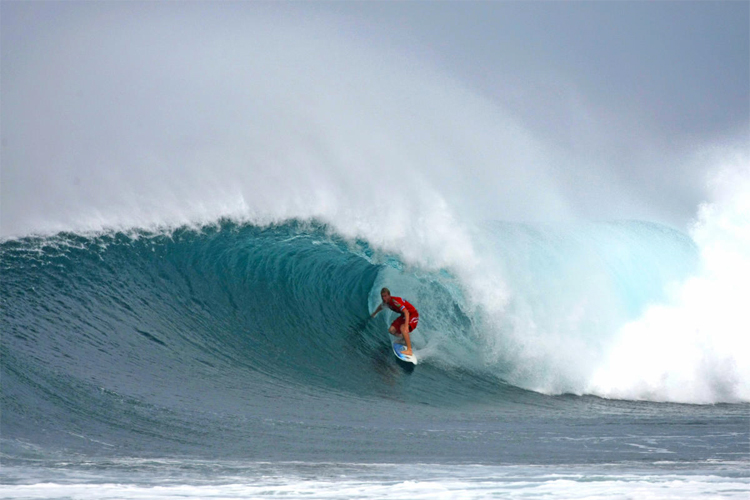
Monte Verde
A beach with a sandy seafloor, multiple peaks, four surfing areas: rights at the swimming pool to the east, rights and lefts at the parking lot, rights and lefts in the middle of the beach, and lefts at Espinafres to the west.
Three different currents affect this beach’s seafloor during the winter. Strong flows – pushing the sand out – in conjunction with the constant breaking of the wave waves – pushing the sand to the beach – tend to form sandbanks and high-quality waves.
With strong, side-off SW winds, it becomes a world-class windsurfing spot. With NE and NW winds, it turns into the perfect spot for kitesurfing.
Wave Type: Beach Break
Wave Direction: Left, Right
Consistency: *****
Quality: ****
Seafloor: Sand
Best Swell Direction: NW-N-NE
Best Wind Direction: S-SE
Best Tide: Half
Best Size: 0.5-2 meters
Experience: Beginner, Intermediate, Advanced
Access: Car
Coordinates: 37.823889, -25.527500
Santa Iria
This is one of the most exotic and isolated spots on the island, with easy access within a 10-minute walk.
The bay’s most famous wave is a left-hand roller with two distinct take-off areas – the westernmost tip of the bay and the middle area closer to the center.
On big days, and with ideal direction of the swell and tide, it is possible to connect the two sections of the wave.
In addition to the lefts, there are rights on the east side of the bay, which are shorter and have a little current, are also very popular.
Wave Type: Point Break
Wave Direction: Left
Consistency: ***
Quality: ****
Seafloor: Rocks
Best Swell Direction: NW-N-NE
Best Wind Direction: S
Best Tide: Half
Best Size: 1-2 meters
Experience: Beginner, Intermediate, Advanced
Access: Walk
Coordinates: 37.826667, -25.471111
Maia
One of the most famous slabs of the island. It is also one of the most popular spots among bodyboarders. Short and very tubular, it is very crowded on perfect days.
The paddle-out can take five to 10 minutes from the fishing port. You may bypass the reef through the right, or take the risk and walk over it.
Wave Type: Reef Break
Wave Direction: Left
Consistency: ***
Quality: *****
Seafloor: Rocks
Best Swell Direction: N
Best Wind Direction: S
Best Tide: Low
Best Size: 1.5-3 meters
Experience: Advanced, Professional
Access: Walk
Coordinates: 37.834641, -25.386903
Baixio da Viola
One of the main big wave spots of the island. Get in and out of the water by Viola Beach though the parking lot.
It is almost an open ocean wave that breaks on the reef, with difficult positioning, currents, but also a large channel that offers some safety.
This is a very isolated wave that is only recommended to experts equipped with surfboards over 9”.
Wave Type: Reef Break
Wave Direction: Left, Right
Consistency: ***
Quality: *****
Seafloor: Rocks
Best Swell Direction: N
Best Wind Direction: S
Best Tide: Half
Best Size: 3-6 meters
Experience: Advanced, Professional
Access: Walk
Coordinates: 37.841667, -25.369444
Fajã do Araújo
Probably one of the more tubular, long, and powerful waves of São Miguel. Get in and out through the rocks on the inside. The wave has a quite vertical take-off followed by fast and tubular sections. The size of the wave and its proximity to the rocks make this location one of the most dangerous spots on the island.
Wave Type: Point Break
Wave Direction: Left
Consistency: **
Quality: *****
Seafloor: Pebbles
Best Swell Direction: W-NW
Best Wind Direction: NW
Best Tide: Low
Best Size: 3-4 meters
Experience: Advanced, Professional
Access: Car
Coordinates: 37.796111, -25.141667
Ribeira Quente
A very maneuverable left peak, and a very popular spot during the summer swells. Compared to other spots, this wave is known for its hot water due to the numerous underwater hot springs that exist on the beach, but also for its urchins that are common on the sea bottom.
Wave Type: Point Break
Wave Direction: Left
Consistency: ***
Quality: ****
Seafloor: Pebbles
Best Swell Direction: S
Best Wind Direction: N
Best Tide: Low
Best Size: 1-2 meters
Experience: Intermediate, Advanced
Access: Car
Coordinates: 37.728056, -25.307778
Amora
This spot is accessible after a 20-minute walk and features a left peak. It is mostly uncrowded and is located in an area surrounded by fishermen’s huts framed in a unique landscape.
Wave Type: Reef Break
Wave Direction: Left
Consistency: **
Quality: ***
Seafloor: Rocks
Best Swell Direction: S
Best Wind Direction: N-NE
Best Tide: Low
Best Size: 1-2 meters
Experience: Beginner, Intermediate, Advanced
Access: Walk
Coordinates: 37.723889, -25.343611
Baixio da Vila
An extremely fun, very long, but somehow fat left-hand wave. This spot is a much sought after by locals – especially beginners – and features unique conditions for more relaxed surf with stand-up paddleboards or longboards. It is only possible to surf it during high tide. With strong E and W winds, it showcases epic conditions for windsurfing.
Wave Type: Reef Break
Wave Direction: Left
Consistency: **
Quality: ***
Seafloor: Rocks
Best Swell Direction: S
Best Wind Direction: N-NE
Best Tide: High
Best Size: 1-2 meters
Experience: Beginner, Intermediate, Advanced
Access: Car
Coordinates: 37.711667, -25.432222
Corpo Santo – Baixio do Açougue
With two-meter plus south swells, this spot is one of the most powerful of the southern coast. It showcases a triangular peak that breaks on both sides, especially to the left, and a wave with a big wall that only ends on the rocky shore.
Wave Type: Reef Break
Wave Direction: Left, Right
Consistency: *
Quality: ****
Seafloor: Rocks
Best Swell Direction: S
Best Wind Direction: N-NE
Best Tide: Low
Best Size: 2-3 meters
Experience: Advanced
Access: Car
Coordinates: 37.713056, -25.436111
Água d’Alto
A good alternative to escape the crowded Milícias Beach when conditions are good. The main spot is located left of the Hotel Bahia Palace. When the sandbanks are in good shape, you can surf a nice right on the west corner of the beach. When the winds are strong from the W and NW, it is much sought after by kiteboarders and windsurfers.
Wave Type: Beach Break
Wave Direction: Left, Right
Consistency: **
Quality: ***
Seafloor: Sand
Best Swell Direction: S
Best Wind Direction: N-NE
Best Tide: Low
Best Size: 1 meter
Experience: Beginner, Intermediate
Access: Car
Coordinates: 37.714444, -25.471667
Milícias
A beach with multiple left and right peaks throughout the year, especially during the summer, when it features waves coming from the south. The main peak is on the left corner.
It is one of the most crowded spots on the island of São Miguel – and perhaps in the Azores – especially famous left break comes to life.
In addition, it is a very versatile beach with SE and SW winds, and very popular for windsurfing and kitesurfing.
Wave Type: Beach Break
Wave Direction: Left, Right
Consistency: ****
Quality: *****
Seafloor: Sand
Best Swell Direction: S
Best Wind Direction: N-NE
Best Tide: Low, Half
Best Size: 1 meter
Experience: Beginner, Intermediate, Advanced
Access: Car
Coordinates: 37.749167, -25.623611
Praia de São Roque
A small beach located in the center of the parish of São Roque just below the church.
This beach is frequently adopted by beginner surfers throughout the year since it is very safe. The main peak is a right-hander that, depending on the sandbanks, starts to break along the seawall of the seaside avenue.
You can also surf a left that breaks next to a small stone reef, and that peels over a sandy bottom all the way into the beach,
In the winter, it is one of the best and most sheltered spots when storms come from the west and southwest.
Wave Type: Beach Break
Wave Direction: Left, Right
Consistency: ***
Quality: ***
Seafloor: Sand
Best Swell Direction: S-SW-W
Best Wind Direction: NW-N-NE
Best Tide: Low, Half
Best Size: 1 meter
Experience: Beginner, Intermediate
Access: Car
Coordinates: 37.749444, -25.630833
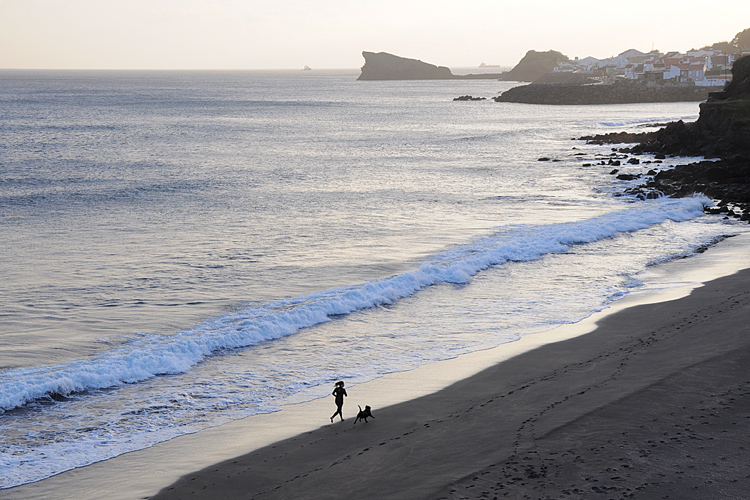
2. Terceira Island
Quatro Ribeiras
This is a powerful left-hand wave breaking on the north coast of the island that reaches its best potential with W, three-meter plus swells, and long periods between sets.
It has a very complicated entrance and exit over large rocks located on the shore, so it is a spot for experienced surfers only.
Wave Type: Reef Break
Wave Direction: Left
Consistency: ***
Quality: ****
Seafloor: Pebbles
Best Swell Direction: W
Best Wind Direction: S
Best Tide: Half
Best Size: 1-3 meters
Experience: Intermediate, Advanced
Access: Walk
Coordinates: 38.795000, -27.185556
Praia da Vitória
Two waves break between the Praia da Vitória piers – Riviera and Vietnam. Both waves are very maneuverable and offer long lefts.
With a proper swell direction and the right tide, it also creates good right-hand waves.
Surfers get in and out through the rocks or the beach located further south. It is one of the most crowded peaks on the island.
With strong NE winds, it is one of the best spots in the Azores for wave sailing.
The bay of Praia da Vitória has excellent conditions for windsurfing and kitesurfing, especially with N-NE, E, and SE-S winds. The area also hosts several Formula Windsurfing World Championships.
Wave Type: Reef Break
Wave Direction: Left
Consistency: ****
Quality: *****
Seafloor: Rocks
Best Swell Direction: NW-N
Best Wind Direction: W-NW
Best Tide: Half
Best Size: 1-2 meters
Experience: Beginner, Intermediate, Advanced
Access: Car
Coordinates: 38.718611, -27.059722
Santa Catarina
Santa Catarina is one of the most famous slabs in Europe. The spot has hosted national and world bodyboarding tour events.
It is a very tubular and flat-bottom wave, breaking very close to the stones, and has been nicknamed “deadly princess.”
Surfers get in and out of the water through a small ramp located near a small sheltered corner of the south of the bay. It is recommended to wear a helmet.
Wave Type: Reef Break
Wave Direction: Left, Right
Consistency: **
Quality: *****
Seafloor: Rocks
Best Swell Direction: NW-N
Best Wind Direction: SW-W
Best Tide: Half
Best Size: 1-2 meters
Experience: Advanced, Professional
Access: Car
Coordinates: 38.708056, -27.048056
Porto Martins
One of the longest and most powerful left-hand waves of the island. The area offers giant NW swells with long periods between sets.
It works the same way with both N and NE swells, although the wave becomes more soft and mushy. With S swells, it is possible to surf right next to a small fishing port.
The entrance in the water is made in front of the peak, through the stones or paddling from the fishing port.
Wave Type: Point Break
Wave Direction: Left
Consistency: ***
Quality: *****
Seafloor: Rocks
Best Swell Direction: NW-N
Best Wind Direction: NW-NE
Best Tide: Half
Best Size: 2-4 meters
Experience: Intermediate, Advanced
Access: Car
Coordinates: 38.676389, -27.057500
Contendas
Located in the Contendas Bay Natural Reserve, this small bay offers a left that works well with S swells.
Given the small size of the area, the wave begins close and breaks to the right at the west corner of the bay. Please pay attention to the ocean floor – it is full of urchins, so we recommended the use of booties.
Wave Type: Reef Break
Wave Direction: Left
Consistency: ***
Quality: ***
Seafloor: Pebbles
Best Swell Direction: S
Best Wind Direction: W
Best Tide: Half
Best Size: 1-2 meters
Experience: Intermediate, Advanced
Access: Car
Coordinates: 38.646111, -27.078056
São Mateus
A right peak wave located next to the famous fishing village. Get in and out of the water over the stone slab.
Wave Type: Point Break
Wave Direction: Right
Consistency: **
Quality: ****
Seafloor: Rocks
Best Swell Direction: S-SW
Best Wind Direction: N
Best Tide: Low
Best Size: 1-2 meters
Experience: Intermediate, Advanced
Access: Car
Coordinates: 38.654167, -27.273333
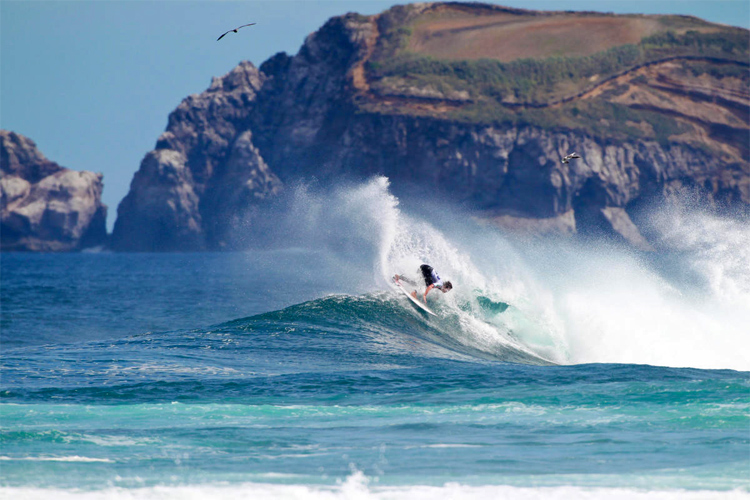
4. Graciosa Island
Calhau Miúdo
It’s one of the most consistent spots in the island. The area offers several northern swells. It features a right and left-hand peak in the center of the bay, and a left to the west corner.
All peaks work depending on the direction of the swell. The entrance and exit are made through the inside rocks. We recommend the use of booties.
Wave Type: Reef Break
Wave Direction: Left, Right
Consistency: ****
Quality: ****
Seafloor: Pebbles
Best Swell Direction: NW-N-SE
Best Wind Direction: S-SE
Best Tide: Half
Best Size: 1-3 meters
Experience: Intermediate, Advanced
Access: Car
Coordinates: 39.083611, -28.053611
Baía da Barra
A right and left-hand surf break. Get in and out of the water easily be via Clube Naval da Ilha Graciosa (CNIG), but expect a long paddle to the outside.
The shorter way to get out-the-back is by jumping off the rock just at the end of the left part of the wave.
This wave features two take-off spots.
On the bigger days, the take-off can be performed on the outside and is quite smooth. The inside drop is quite vertical and precedes a very tubular section.
The right-hand wave can only be surfed on medium and small-sized days.
The left-hand wave is better, more vertical, and hollow, but ends up in the rocks. With smaller and medium waves, the right is the best option for beginners.
Wave Type: Reef Break
Wave Direction: Left, Right
Consistency: *****
Quality: *****
Seafloor: Rocks
Best Swell Direction: NW-N
Best Wind Direction: W-NW-SW
Best Tide: Low, Half
Best Size: 1-3 meters
Experience: Beginner, Intermediate, Advanced
Access: Car
Coordinates: 39.082778, -27.992222
Alagoa
Probably the most technically accessible wave on the island.
It’s primarily a left-hand wave, but a right can occasionally be surfed.
With an easy take-off, it offers a very maneuverable wall. The entry is made through a small stone beach.
Wave Type: Reef Break
Wave Direction: Left, Right
Consistency: ****
Quality: ***
Seafloor: Rocks
Best Swell Direction: N-SE
Best Wind Direction: W-SW
Best Tide: Half
Best Size: 1-2 meters
Experience: Beginner, Intermediate, Advanced
Access: Car
Coordinates: 39.059167, -27.975000
Ilhéu da Praia
This is a big wave spot. It features a barreling wave with a vertical takeoff that breaks over a shallow reef.
The wave offers a long wall that peels along the shore from north to south.
Because it is a closed area, you’ll need a previous authorization issued by the local environmental services.
Given the distance from the coast, it is necessary to use a boat to get you there and provide support.
Wave Type: Point Break
Wave Direction: Right
Consistency: ***
Quality: *****
Seafloor: Rocks
Best Swell Direction: N-SE
Best Wind Direction: SW
Best Tide: Half
Best Size: 3 meters
Experience: Advanced, Professional
Access: Car
Coordinates: 39.057778, -27.957778
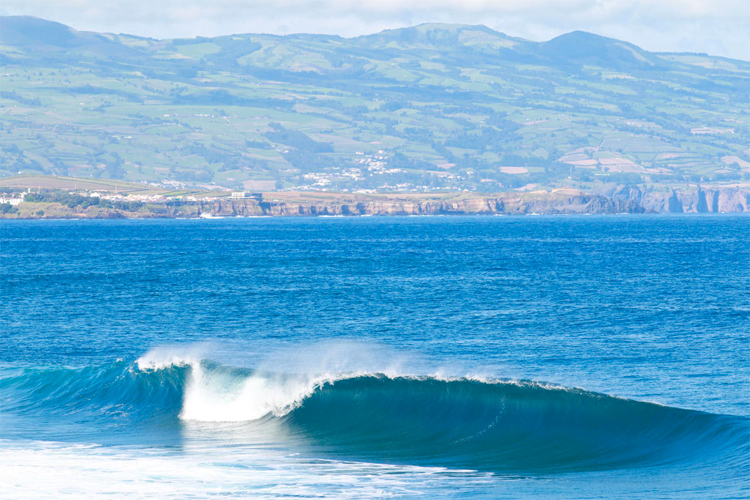
5. São Jorge Island
Cubres
A wave that works with large swells and breaks much closer to the rocks compared to the spots of Fajã do Santo Cristo.
It is a powerful left-hand wave located east of the Fajã dos Cubres that, on certain days, allows you to surf a few rights.
Wave Type: Point Break
Wave Direction: Left
Consistency: *****
Quality: ****
Seafloor: Pebbles
Best Swell Direction: S-SE
Best Wind Direction: N
Best Tide: Half
Best Size: 2-3 meters
Experience: Intermediate, Advanced
Access: Car
Coordinates: 38.643333, -27.963611
Fajã do Belo
A powerful left-hand wave with vertical takeoffs and occasional tube sections. The entrance and exit are made through the rocks located at the end of the breaking wave.
Wave Type: Point Break
Wave Direction: Left
Consistency: ***
Quality: *****
Seafloor: Pebbles
Best Swell Direction: N-NE
Best Wind Direction: S
Best Tide: Half
Best Size: 2-3 meters
Experience: Intermediate, Advanced
Access: Walk
Coordinates: 38.631389, -27.941667
Direitas do Paço – Fajãs do Santo Cristo
A collection of long rights with super maneuverable walls.
With medium-sized waves, the takeoff is made near a rock located on the outside. The entrance and exit points are made via a small cove that is used to dock small boats.
Wave Type: Point Break
Wave Direction: Right
Consistency: ****
Quality: *****
Seafloor: Pebbles
Best Swell Direction: N-NE
Best Wind Direction: S
Best Tide: Half
Best Size: 1-3 meters
Experience: Intermediate, Advanced
Access: Walk
Coordinates: 38.627778, -27.931389
Feiticeiras
A right and left-hand spot located on the edge of Fajã. It has a beach break formation and pumps waves with small swells. The entrance and exit are through the rocks.
Wave Type: Reef Break
Wave Direction: Left, Right
Consistency: ****
Quality: *****
Seafloor: Pebbles
Best Swell Direction: N
Best Wind Direction: S
Best Tide: Half
Best Size: 1-2 meters
Experience: Intermediate, Advanced
Access: Walk
Coordinates: 38.628333, -27.930278
Esquerdas da Igreja – Fajãs de Santo Cristo
A left peak with the takeoff zone sitting in front of the church.
It offers long and highly maneuverable wave faces. The entrance and exit are made through the rocks at the end of the breaking wave.
Wave Type: Point Break
Wave Direction: Left
Consistency: ****
Quality: *****
Seafloor: Pebbles
Best Swell Direction: N
Best Wind Direction: S
Best Tide: Half
Best Size: 1-2 meters
Experience: Intermediate, Advanced
Access: Walk
Coordinates: 38.627778, -27.927500
Largo do Linho – Fajãs de Santo Cristo
A surf spot located east of Caldeira that can hold larger swells.
It delivers extremely powerful, barreling waves with vertical takeoffs. The entrance and exit are made through the rocks.
Wave Type: Point Break
Wave Direction: Left
Consistency: ***
Quality: *****
Seafloor: Pebbles
Best Swell Direction: NW-N
Best Wind Direction: SW-S
Best Tide: Half
Best Size: 3 meters
Experience: Intermediate, Advanced
Access: Walk
Coordinates: 38.625000, -27.924722
Vimes
A spot that pumps left-hand waves with S swells. With NW and some SW swells, it is possible to surf a right in the western corner. The entrance and exit are made through the rocks at the end of the breaking wave.
Wave Type: Point Break
Wave Direction: Left
Consistency: **
Quality: ****
Seafloor: Pebbles
Best Swell Direction: S-SE
Best Wind Direction: N
Best Tide: Half
Best Size: 1-2 meters
Experience: Intermediate, Advanced
Access: Car
Coordinates: 38.583333, -27.932778
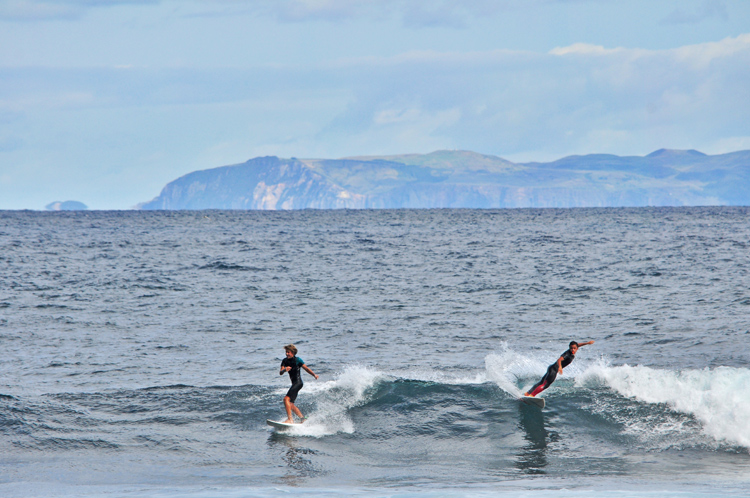
6. Pico Island
Cachorro – Baía do Poço
A surf break producing powerful lefts with a fast take-off over a shallow slab, followed by a highly maneuverable wall.
The entrance and exit are made over the rocks at the west corner of the bay. You can also paddle to the Cais do Mourato’s swimming pools located half a mile to the west.
Wave Type: Point Break
Wave Direction: Left
Consistency: ***
Quality: ****
Seafloor: Rocks
Best Swell Direction: NW-N
Best Wind Direction: S
Best Tide: Half
Best Size: 2-3 meters
Experience: Intermediate, Advanced
Access: Car
Coordinates: 38.560000, -28.472500
Baía da Barca
This is the most consistent spot on the island, and also the most visited one. The entrance and exit are made through the stones located west or east the bay.
Wave Type: Reef Break
Wave Direction: Left, Right
Consistency: *****
Quality: *****
Seafloor: Rocks
Best Swell Direction: NW-N-NE
Best Wind Direction: S
Best Tide: Half
Best Size: 1-3 meters
Experience: Intermediate, Advanced
Access: Car
Coordinates: 38°32’28″N 28°31’20″W
Areia Larga
This is a right-hand wave that reaches its maximum potential with long period, NE and E swells. The entrance and exit are made easily through the port’s ramp.
Wave Type: Point Break
Wave Direction: Right
Consistency: **
Quality: ***
Seafloor: Rocks
Best Swell Direction: N-NE
Best Wind Direction: NE-E
Best Tide: Half
Best Size: 3 meters
Experience: Intermediate, Advanced
Access: Car
Coordinates: 38.526944, -28.537222
Lajes
A right and left-hand peak that essentially works during summer swells. The entrance and exit are made near the natural pools.
Wave Type: Reef Break
Wave Direction: Left, Right
Consistency: **
Quality: ****
Seafloor: Rocks
Best Swell Direction: S
Best Wind Direction: N
Best Tide: Half
Best Size: 1-2 meters
Experience: Intermediate, Advanced
Access: Car
Coordinates: 38.388333, -28.252778
Santo Amaro – Baía do Canto
The best and the biggest spot on the island. It begins to break with three-meter plus NW swells.
It is a long, powerful left-hand wave with several tubular sections. The entrance and exits are made through the rocks, and it is sometimes tricky to get out.
This is a wave for experienced and highly skilled professional big wave surfers.
Wave Type: Point Break
Wave Direction: Left
Consistency: **
Quality: *****
Seafloor: Pebbles
Best Swell Direction: NW
Best Wind Direction: S
Best Tide: Half
Best Size: 3 meters
Experience: Advanced, Professional
Access: Car
Coordinates: 38.454444, -28.141944
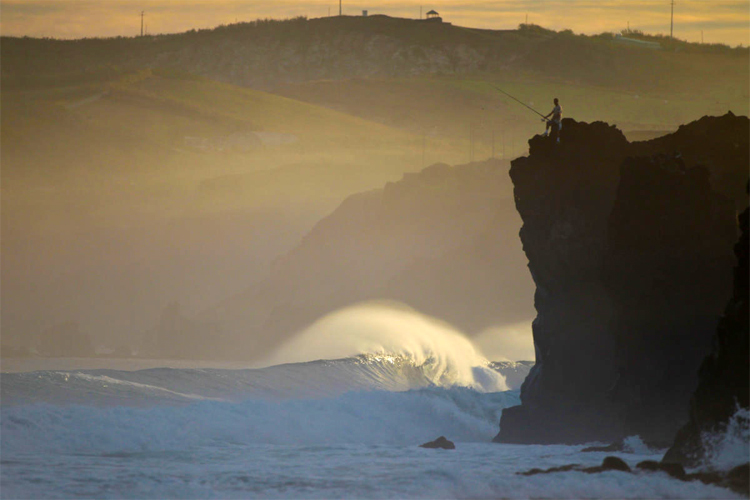
7. Faial Island
Praia do Norte
Located in Faja do Norte, this is the most consistent and crowded wave of the island, offering multiple right and left-hand peaks. The entrance and exit are made through the beach.
Wave Type: Beach Break
Wave Direction: Left, Right
Consistency: ****
Quality: ****
Seafloor: Sand
Best Swell Direction: N
Best Wind Direction: S
Best Tide: Low
Best Size: 1-2 meters
Experience: Beginner, Intermediate, Advanced
Access: Car
Coordinates: 38.610556, -28.758056
Ponta da Ribeirinha
This is Faial’s big wave spot. It’s a wave that reaches its maximum potential with large NW swells. The entrance and exit are made through the rocks at the end of the breaking wave, via the ramp located near the pier.
Wave Type: Point Break
Wave Direction: Left, Right
Consistency: ***
Quality: ****
Seafloor: Pebbles
Best Swell Direction: NW-N
Best Wind Direction: W
Best Tide: Low
Best Size: 3 meters
Experience: Intermediate, Advanced
Access: Car
Coordinates: 38.591944, -28.598056
Praia do Almoxarife
One of the coolest surf spots, framed by the stunning the Pico Mountain. A beach break that peels to the right with south swells. Depending on the sandbank, the wave can offer long, maneuverable walls.
Wave Type: Beach Break
Wave Direction: Right
Consistency: **
Quality: ***
Seafloor: Sand
Best Swell Direction: S
Best Wind Direction: NW-N
Best Tide: Low
Best Size: 1-2 meters
Experience: Beginner, Intermediate, Advanced
Access: Car
Coordinates: 38.552222, -28.607222
Praia da Conceição
A spot located near the Horta city center. It is a beach break that works with S swells, especially in summer.
Wave Type: Beach Break
Wave Direction: Left
Consistency: **
Quality: ***
Seafloor: Sand
Best Swell Direction: S
Best Wind Direction: N
Best Tide: Low
Best Size: 1 meter
Experience: Beginner, Intermediate, Advanced
Access: Car
Coordinates: 38.542778, -28.617778
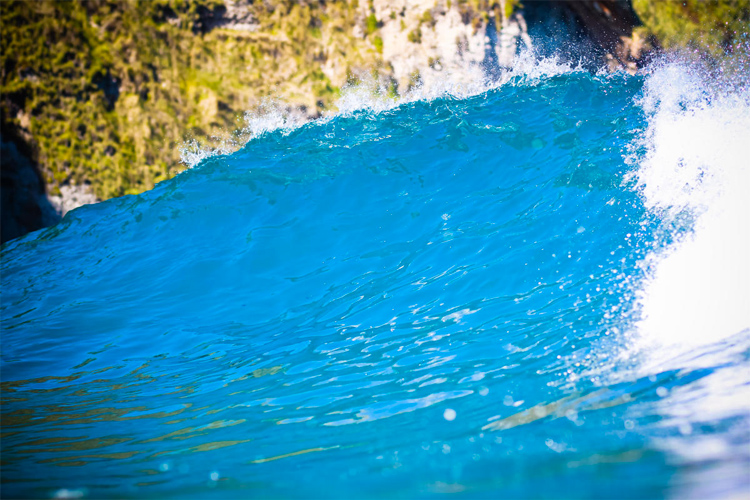
8. Flores Island
Quebrada Nova – Fanais
Located in the Fajã Quebrada Nova, this spot is only accessible by foot. Be prepared for a one-way, two-hour walk.
The trip can be made toward the Ponta Delgada lighthouse or by Fajã Grande via a trail that is subject to landslides.
It is essential to collect information on the status of the trails.
This is the most westerly wave in Europe and is located in a beautiful natural area with fabulous views of the Monchique Islet and Maria Vaz Islet.
Wave Type: Point Break
Wave Direction: Right
Consistency: ****
Quality: ****
Seafloor: Pebbles
Best Swell Direction: NW-N
Best Wind Direction: E
Best Tide: Low
Best Size: 1-2 meters
Experience: Intermediate, Advanced
Access: Walk
Coordinates: 39.497778, -31.248611
Ponta Ruiva
This is a spot that produces big and powerful left-hand waves with Corvo Island in the background.
The access is made down the slope by a shortcut or by boat from Santa Cruz. The entrance and exit are tricky and only recommended to experienced surfers.
Wave Type: Point Break
Wave Direction: Left
Consistency: ***
Quality: ****
Seafloor: Pebbles
Best Swell Direction: W-NW
Best Wind Direction: SW
Best Tide: Low
Best Size: 3-4 meters
Experience: Advanced, Professional
Access: Walk, Boat
Coordinates: 39.496944, -31.152778
Fajão Lopo Vaz
Located in the south of the island, this Fajã offers long right-hand waves that require large N or NW swells.
The access is made by a trail – expect a one-hour walk. You can also reach the wave through the Lajes harbor. Getting in and out of the water may be complicated due to the rocks.
Wave Type: Point Break
Wave Direction: Right
Consistency: ***
Quality: ****
Seafloor: Pebbles
Best Swell Direction: N-NW
Best Wind Direction: N
Best Tide: Low
Best Size: 3-4 meters
Experience: Advanced, Professional
Access: Walk, Boat
Coordinates: 39.372222, -31.224722
Fajazinha
A right-hand peak with large and hollow waves located in the northern corner of Fajazinha. The entrance and exit are extremely difficult. The place offers a breathtaking sunset.
Wave Type: Reed Break
Wave Direction: Right
Consistency: **
Quality: ****
Seafloor: Pebbles
Best Swell Direction: N-NE
Best Wind Direction: E
Best Tide: Low
Best Size: 3 meters
Experience: Advanced, Professional
Access: Car
Coordinates: 39.439444, -31.261944
Fajã Grande
Located in the Fajã Grande Bay facing the cascade of Poço do Bacalhau, you’ll find a medium-sized wave that breaks essentially to the left.
With larger swells, it creates a right-hand wave further north, on the edge of Fajã. The entrance and exit are made, but you can also paddle in and out from the Fajã Grande fishing harbor.
Wave Type: Reef Break
Wave Direction: Left, Right
Consistency: ***
Quality: ****
Seafloor: Pebbles
Best Swell Direction: N-NE
Best Wind Direction: E
Best Tide: Low
Best Size: 2-3 meters
Experience: Intermediate, Advanced
Access: Car
Coordinates: 39.461944, -31.259167
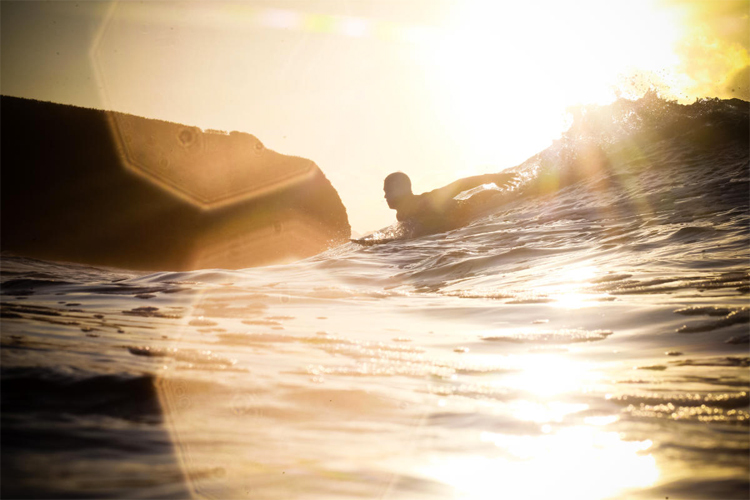
9. Santa Maria Island
Anjos
The best and most famous wave of Anjos Bay is located in front of the natural pools’ parking lot.
Surfers get in and out through the rocks, in front of the wave, and on big days through the pool or even the fishing port located to the west.
It is a fat and powerful wave that allows you to perform several maneuvers. On smaller days, some pointy rocks may appear on the surface on the inside.
Wave Type: Point Break
Wave Direction: Right
Consistency: ***
Quality: ****
Seafloor: Rocks
Best Swell Direction: N-NE
Best Wind Direction: S-SE
Best Tide: Half, High
Best Size: 2-3 meters
Experience: Intermediate, Advanced
Access: Car
Coordinates: 37.006667, -25.156944
Formosa
Formosa is the best wave of the island. It features a very fast take-off and a nice wall on the inside that breaks in front of the castle located west of the beach.
You may enter and exit the water through the beach.
With two-meter plus swells, waves no longer interact with the rocky seafloor, the peak shifts slightly to the east, and they become mushier and with more closeouts.
The best time to surf it is during summer, with favorable swells arriving from the south. It’s one of the most crowded spots on the island.
Wave Type: Point Break
Wave Direction: Right
Consistency: **
Quality: *****
Seafloor: Rocks
Best Swell Direction: S-SW
Best Wind Direction: N-NE
Best Tide: Low, Half
Best Size: 1-2 meters
Experience: Intermediate, Advanced
Access: Car
Coordinates: 36.950556, -25.101111

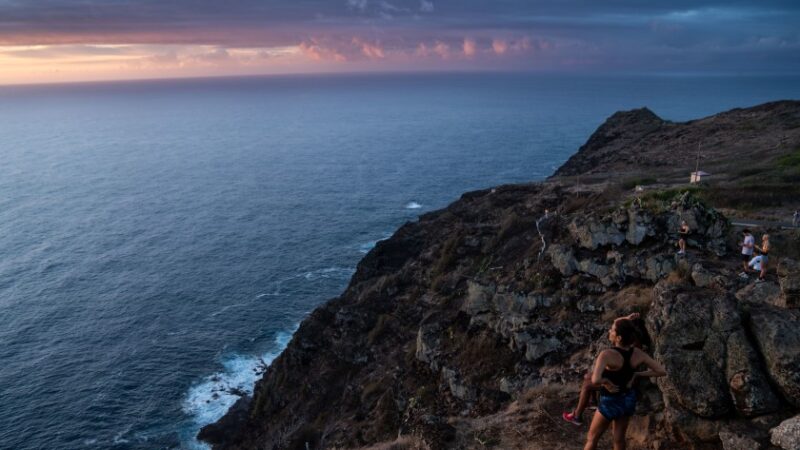
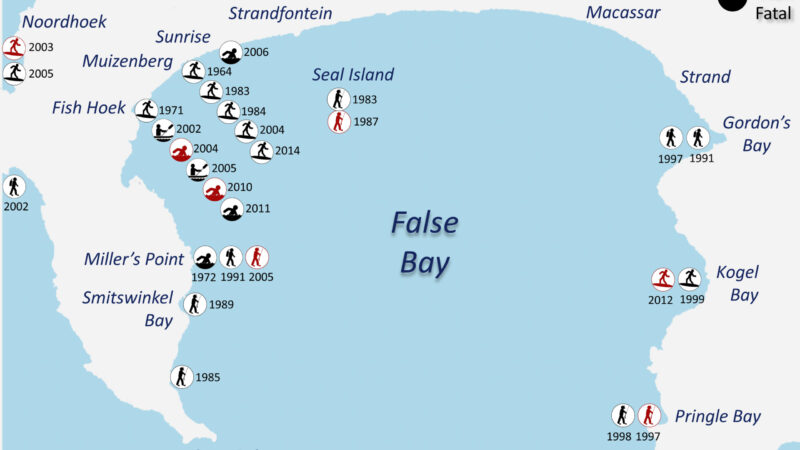
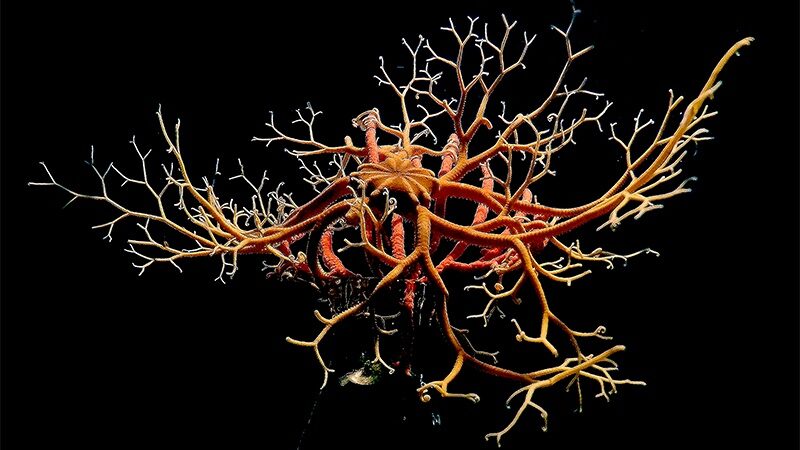
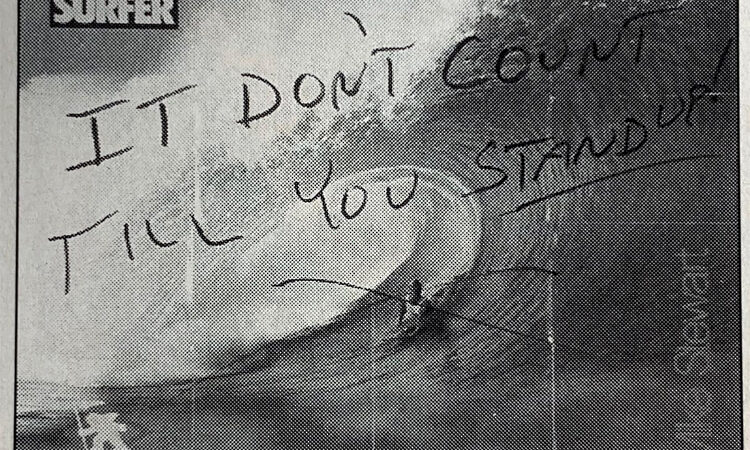
Recent Comments